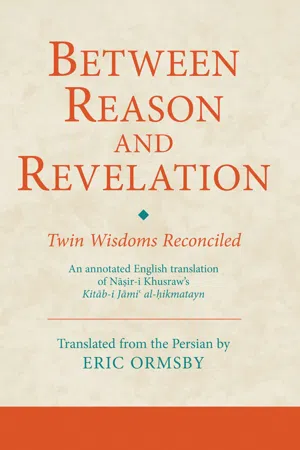
- 304 pages
- English
- ePUB (mobile friendly)
- Available on iOS & Android
About this book
I.B.Tauris in association with the Institute of Ismaili Studies This is the first English translation of the final philosophical work of the great eleventh-century Ismaili thinker, poet, and Fatimid emissary, N?sir-i Khusraw. Appointed from Cairo by command of the Fatimid Imam-caliph al-Mustansir to serve first as a d?'?, and then as the hujjat, for the entire region of Khur?s?n, he maintained his allegiance both to his mission and his Imam-caliph for the rest of his life, even when threatened and driven into exile. Written
during his exile in Badakhsh?n in the year 1070, N?sir-i Khusraw here develops a powerful presentation of both Aristotelian philosophy and Ismaili exegesis, or ta'w?l, and strives to show that they are ultimately in harmony. The work is presented as a learned commentary on a long philosophical poem, written in the previous century and sent to N?sir by the am?r of Badakhsh?n, 'Al? b. al-Asad, who copied the poem out in his own hand from memory and asked the poet-philosopher to explicate it. In doing so, N?sir ranges over a huge span of topics from logic and language to the nature of the physical world, from the spheres of the highest heavens to the plants and animals of the earthly realm, and, most importantly, hidden spiritual realities: the esoteric (b?tin) as well as the exoteric (z?hir) realms. He thus discusses the nature of God, the creation of human beings, and the mysteries concealed in the physical world, itself a reflection of a higher, transcendent realm. Between Reason and Revelation: Twin Wisdoms Reconciled is an annotated translation of the Persian text prepared by Henry Corbin and Mohammed Mu'?n based on the single surviving manuscript of the work, now in the Süleymaniye Mosque Library in Istanbul. It is a work of great philosophical and spiritual insight, which is also a pioneering attempt to tackle difficult
intellectual problems in the Persian language; it is at once lucid and lyrical, precise and speculative. N?sir's influence has been immense as both a poet and a thinker, and the Kit?b-i J?mi' al-hikmatayn is his crowning work.
Frequently asked questions
- Essential is ideal for learners and professionals who enjoy exploring a wide range of subjects. Access the Essential Library with 800,000+ trusted titles and best-sellers across business, personal growth, and the humanities. Includes unlimited reading time and Standard Read Aloud voice.
- Complete: Perfect for advanced learners and researchers needing full, unrestricted access. Unlock 1.4M+ books across hundreds of subjects, including academic and specialized titles. The Complete Plan also includes advanced features like Premium Read Aloud and Research Assistant.
Please note we cannot support devices running on iOS 13 and Android 7 or earlier. Learn more about using the app.
Information
Table of contents
- Cover Page
- Title Page
- Contents
- Illustrations
- Abbreviations
- Introduction
- Translation of Kitāb-i Jāmiʿ al-ḥikmatayn: The Book of Twin Wisdoms Reconciled
- Exordium
- 1. The Reason for the Composition of this Book; its Title
- 2. The Qaṣīda of Aḥmad b. Ḥasan al-Jurjānī
- 3. On the Proof of the Creator’s Existence with a Discussion of His Oneness, in Several Discourses
- 4. Aristotle’s Teaching on the Four Parts of Speech
- 5. On Form, Property, Definition, and Description
- 6. The Definition of ‘I’
- 7. On the Body, on the Soul, on the Intelligence
- 8. On the Seven Lights
- 9. On Eternity, Truth, Pleasure, Life as it Passes, Perfection, and Occultation
- 10. On Universal Nature
- 11. On Angel, Parī, Demon
- 12. A Commentary on ‘One’
- 13. Of Species and Genus
- 14. On Happiness and Unhappiness. And on Yesterday, Today, and Tomorrow
- 15. Properties of Minerals, Animals, and Places
- 16. On Language, Discourse, and Speech
- 17. On Pre-Eternity, Duration, Eternity, and Eternity without End
- 18. On the Moon’s Properties
- 19. On the Necessity of Human Education
- 20. About ibdāʿ (Origination)
- 21. On the Emergence of the Species from the Individual
- 22. On Intellect and Knowledge
- 23. On the Difference between the Perceiver and the Act of Perception
- 24. On the Creation of Heaven and Earth
- 25. On the Circle, the Chicken, and the Egg
- 26. On the Whole and the Part
- 27. On Saturn, Seed of Spring
- 28. On the Houses of the Sun and the Moon
- 29. On the Influence of Auspicious and Ominous Stars on the Soul and the Body
- 30. On Spiritual Father and Mother
- 31. On Questions without Answers about the Properties of the Elements
- 32. On the Poet’s Resolve to Reply to his own Questions
- 33. That the Learned Man is Alive, the Ignorant Man Dead
- 34. Conclusion of the Book
- Bibliography
- Index
- eCopyright